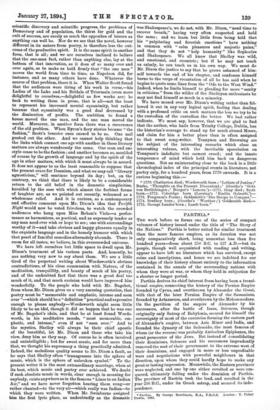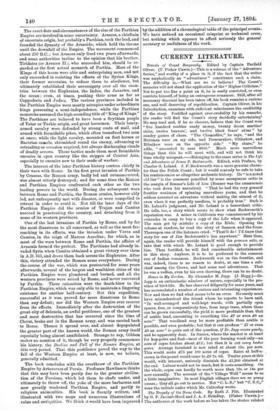PARTHIA.*
THE work before us forms one of the series of compact volumes of history issued under the title of " The Story of the Nations." Parthia is better suited for similar treatment than the more famous empires, as its duration was not only comparatively short, being somewhat less than five hundred years—from about 250 B.C. to 227 A.D.—but its people, though well acquainted with reading and writing, appear to have left no literature which has survived, except coins and inscriptions, and hence we are indebted for our knowledge of their history almost entirely to the information contained in the annals of the surrounding nations with whom they were at war, or whom they held in subjection for a shorter or longer period.
Parthia derives its chief interest from having been a transi- tional empire, connecting the history of the Persian Empire founded by Cyrus, and overthrown by Alexander the Great, with that of the later Persian Empire of the Sassanians, founded by Artaxerxes, and overthrown by the Mohammedans. On the partition of the empire of Alexander by his successors, after the battle of Issas, Seleucus, though originally only Satrap of Babylonia, secured for himself the sovereignty of most of the countries forming the eastern part of Alexander's empire, between Asia Minor and India, and founded the dynasty of the Seleucida3, the most famous of whom (or the reverse) was probably Antiochus Epiphanes, the great persecutor of the Jews. But instead of consolidating their dominions, Seleucus and his successors imprudently removed the seat of their government to the extreme west of their dominions, and engaged in more or less unprofitable wars and negotiations with powerful neighbours in that direction, upon whom they could hardly hope to make any great or lasting impression. Meanwhile, the Eastern provinces were neglected, and one by one either revolted or were con- quered, ultimately falling under the dominion of Parthia. The province of Bactria took the lead, and revolted in the year 256 B.C., under its Greek satrap, and secured its inde- pendence.
• Parthia. By George Rawlinson, F.R.G.S. London : 1'. Fisher Unwin. 1893.
The exact date and circumstances of the rise of the Parthian Empire are involved in some uncertainty. Arsaces, a chieftain of uncertain origin, but probably a Parthian, took the lead, and founded the dynasty of the Arsacidte, which held the throne until the downfall of the Empire. The movement commenced about 250 B.C. ; but Arsaces only lived two years afterwards, and some authorities incline to the opinion that his brother, Tiridates (or Arsaces IL), who succeeded him, should be re- garded as the first actual monarch of Parthia. Most of the 'Kings of this house were able and enterprising men, and not only succeeded in resisting the efforts of the Syrian Kings, their former suzerains, to reduce them to obedience, but ultimately established their sovereignty over all the coun- tries between the Euphrates, the Indus, the Jaxartes, and the ocean ; even, at times, pushing their arms as far as Cappadocia and Judaea. The various provinces included in the Parthian Empire were mostly satrapies under subordinate kings possessing a semi-independence, while the Parthian monarchs assumed the high-sounding title of "King of Kings." The Parthians are believed to have been a Scythian people of Tatar or Turkic origin, and great horsemen. Their heavy- armed cavalry were defended by strong coats of mail, and armed with formidable pikes, which often transfixed two men at once; while the light cavalry, mounted on fleet horses or Bactrian camels, skirmished round the enemy, advancing or retreating as occasion required, but always discharging clouds of deadly arrows. These tactics made them most formidable enemies in open country like the steppes of Central Asia, especially to enemies new to their mode of warfare.
The interest of the later Parthian history centres chiefly in their wars with Rome. In the first great invasion of Parthia by Crassus, the Roman army, badly led and outmanoeuvred, was almost utterly destroyed; and for some time the Roman and Parthian Empires confronted each other as the two leading powers in the world. During the subsequent wars between Rome and Parthia, the Roman armies, however ably led, not unfrequently met with disaster, or were compelled to retreat in order to avoid it. Not till the later days of the Parthian Empire did the armies of Trajan and Cassius succeed in penetrating the country, and detaching from it some of its western provinces.
One of the last invasions of Parthia by Rome, and by far the most disastrous to all concerned, as well as the most far- reaching in its effects, was the invasion under Verna and Cassius, in the reign of Marcus Aurelius; for which, as in most of the wars between Rome and Parthia, the affairs of Armenia formed the pretext. The Parthians had already in- vaded Syria when Cassius obtained a great victory over them in A.D. 163, and drove them back across the Euphrates. After this, victory attended the Roman arms everywhere. During the course of the war, which was protracted for some years afterwards, several of the largest and wealthiest cities of the Parthian Empire were plundered and burned, and all the western provinces were seized by Rome, and never recovered by Parthia. These calamities were the death-blow to the Parthian Empire, which was only able to maintain a lingering existence for another half-century. But this expedition, successful as it was, proved far more disastrous to Rome than any defeat; nor did the Western Empire ever recover from its effects. Immediately after the destruction of the great city of Seleucia, an awful pestilence, one of the greatest and most destructive that has occurred since the time of Christ, broke out in the Roman army, and was carried back to Rome. Thence it spread over, and almost depopulated the greater part of the known world, the Roman army itself especially being almost annihilated. Strange to say, Gibbon makes no mention of it, though he very properly commences his history, the Decline and Fall of the Roman Empire, at this very period. That this pestilence paved the way to the fall of the Western Empire at least, is now, we believe, generally admitted.
The book concludes with the overthrow of the Parthian. Empire by Artaxerxes of Persia. Professor Rawlinson thinks that this may have been partly due to the greater civilisa- tion of the Persians, which led them to chafe under, and ultimately to throw off, the yoke of the more barbarous and now greatly weakened Parthian Empire, and partly to religious animosities. His book is fluently written, and illustrated with two maps and numerous illustrations of coins and antiquities. We think it would have been improved
by the addition of a chronological table of the principal events. We have noticed an occasional misprint or technical error, but nothing which appears to affect seriously the general accuracy or usefulness of the work.



















































 Previous page
Previous page